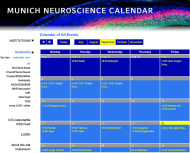“A Tale of Two Sexes: The Neural Dynamics of Dimorphic Behavior”
Prof. Dr. Ev Yemini (UMass Chan Medical School, Worcester, MA, USA) on September 21st, 2023 at 11 AM in room 041 HDC building (3620) or online
21.09.2023
The brain is a complex, dynamic organ in which existing neural circuits are continually reprogrammed to accommodate new behaviors. During sexual maturation, male and female animals from a single species often acquire different or dimorphic behaviors around courtship, copulation, and parenting. However, the same neural circuits must retain nonsexual behaviors like searching for food and avoiding dangerous chemicals. This raises the question: How is
the nervous system of each sex reprogrammed to add dimorphic behaviors at sexual maturity?
To answer this question, we compared dynamic, whole-brain activity between female and male C. elegans worms using “NeuroPAL”, which allows us to simultaneously measure neuron subtype identities and activity in response to a variety of stimuli. Neuron-by-neuron comparisons revealed that sexually-dimorphic circuits are multiplexed together with sexually identical circuits – meaning that a single neuron subtype can show sexually-dimorphic activity
in response to one kind of stimulus, but sexually-identical responses to other kinds of stimuli. These multiplexed circuits are present throughout the nervous system and display sexual dimorphisms across sensory, inter, and locomotory neurons. We used these results to analyze the functional connectomes of both sexes, identifying both known and novel sexually dimorphic neurons and circuits in C. elegans. To determine the mechanisms that program
these multiplexed circuits, we dissected the behavioral roles of individual dimorphic neurons by silencing them and reprograming their sexual identity. In this way, we further discovered sex-specific roles for conserved sensory genes. Our results illuminate conserved neurobehavioral circuit mechanisms and genetic pathways in brain development that establish sexual maturity."
This will be a hybrid event. You can also join the seminar via Teams using the following link:
Click here to join the meeting
Meeting ID: 333 910 247 441
Passcode: mrLzez
If you would like to talk to Prof. Yemini after the talk, please contact Merly.vogt@helmholtz-munich.de
For more information, please visit Prof. Yemini’s website https://www.yeminilab.com/


